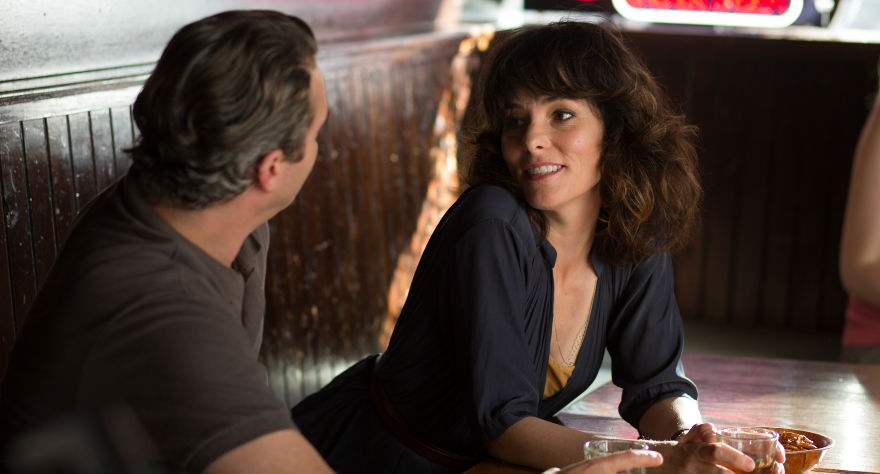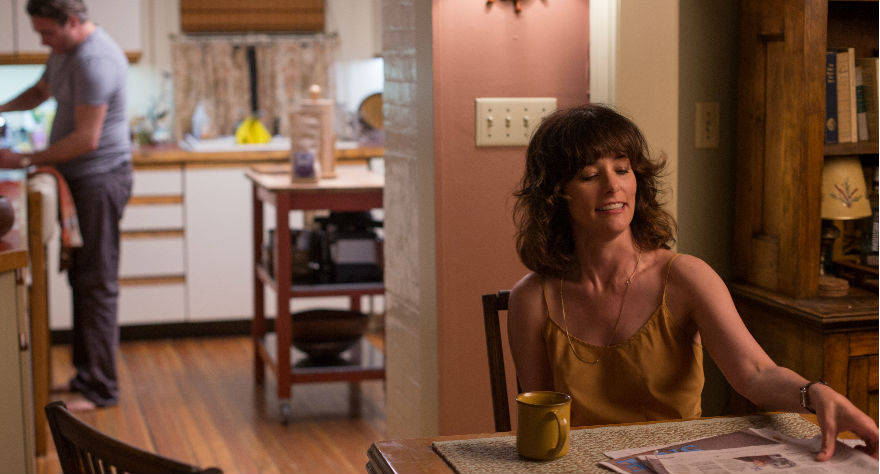Parker Posey Talks ‘Irrational Man,’ Working with Woody Allen and Reflecting On Her Career

It came as a bit of a surprise to me that Woody Allen‘s latest, Irrational Man, marks the director’s very first collaboration with the “Queen of the Indies” herself, Parker Posey. In the dark collegiate comedy she plays Rita, a lonely woman in an unfulfilling marriage who’s drawn to a similarly depressed philosophy professor (Joaquin Phoenix), whose affections are split with a bright, young student (Emma Stone).
Fans have been itching for years for a director to open the floodgates and let Posey unleash her full range of talents as a film’s lead, and though she plays only a secondary role in Allen’s film, it will hopefully mark the start of a long and fruitful partnership between she and the legendary auteur. They’re slated to work together again for Allen’s 2016 project, and I couldn’t me more excited.
During Posey’s visit to San Francisco on the Irrational Man press tour, I spoke with her in a roundtable interview about working with Allen for the first time, her favorite movies in her filmography, a hilarious deleted scene from Best in Show and much more. Irrational Man is out in theaters this Friday, July 24th. [Warning: minor spoilers ahead.]

Having so much experience under your belt as an actor, do you find it easier at this point in your career to get into a dark headspace for a role? Rita is a lonesome woman.
Experience really builds and ages you in a way where the disappointments can make you feel lonely. I was really happy that I was at the right temperature at this time in my life to express that.
There are elements of Rita’s arc that remind me of your character in Personal Velocity. That movie left me wondering what would happen next for this woman. In your mind, where does Rita go after the end of the movie?
I think it’s really tragic, what happens to her. Hopefully she has a good therapist after suffering this disappointment. I think she has enough hold of her fantasy to bounce back from the “irrational man.” She’s intelligent, even if she’s lost herself. She can easily drown in the waters of him, and Emma, too. They both survive this man. It’s a really cool story, for that reason.
Woody Allen has a famously laid-back directing style. Is that something you appreciated, or did you want a more hands-on approach on-set?
I like a lot of freedom when I work, to be left alone in the world that’s been created for you. We’re sliding into this realm. What was different was, after [shooting], he was nowhere to be found! He’d be in the car, going to dinner. [laughs] It’s practical, too. I want to do well, because he has to go to dinner. We all have to eat, even Woody Allen. That’s something that’s very particular to him. He’s going to be 80 this year, and he has a body of work that’s so impressive. The stakes are already high, but he knows that. His ear is so subtle. He doesn’t want any acting; he wants you to be real. I like that way of working.
I was surprised when I realized that you two hadn’t worked together before.
That’s what everyone says!
I think fans who’ve been rooting for you for years…we’ve been waiting for a director to really unleash you, if you know what I mean.
I’m ready to unleash as well! It’s really frustrating to see stories change. I fantasized as a teenager about growing up and becoming a woman and being in grown-up movies. Now, it’s a lot action and werewolves and genre and vampires and video games and sci-fi, movies that are crafted for a gaming culture. The economy’s not that great and people aren’s seeing movies like they used to, so we’ve suffered the loss of a style and a form that we’ve seen kind of disappear. Part of this experience was feeling really blessed.
I do belong in his world and in these kinds of movies. I cherished the experience. To work with someone who is so talented and has a particular way of working—[I was] able to trust that, even if it was hard. I remember he came up to us one day and was like, “What I wrote isn’t very good. You can add whatever you want; feel free.” I added something, and I hear from the video monitor: “That’s terrible!” [laughs] I was like, “Okay. Where’s the shovel, so I can go bury myself?” You’re laughing and crying at the same time.
Didn’t he come up to you and Joaquin early on and tell you you wouldn’t be fired?
Yeah, yeah. And he put his hands out in a really funny way. “Neither of you are getting fired!”
Did that have any effect on your confidence?
Yeah, of course. But he can very easily elicit that feeling from his actors. That’s his right, if it’s not the right fit. You’re in service of his world and his point of view and what he’s trying to accomplish.
Having job security is a good thing, right?
Yeah. We talked about whether I’d be able to survive being let go, or not being right for the part. I think so. I think so. It was a lot of that at work, which also led to, “I hope I’m still in the movie.”
Well, your name’s on the poster, so that’s a good sign.
I know. They reassured me that I was [in it]. [laughs] I only got my twenty pages, so I didn’t know how important my part was. Woody Allen isn’t the kind of writer who says, “Oh, I’ll figure it out in editing,” you know? He does no ADR. He doesn’t like to loop. So you do a scene and he says, “That was good. But it wasn’t good for sound. We’re gonna go again.” I say, “Well, I’m good at ADR!” But he says, “Well, I don’t like doing that.” It brings such a focus and concentration with the whole crew and the actors. It’s a sport, in a way. You feel like you just want to hit what’s happening live on-camera. Joaquin’s so great. He has so much going on, so it’s easy to connect with him.
A minute ago you were talking about how the movie landscape is changing. We mostly see superhero and sci-fi movies in the theater. You’ve had a turn or two in big-budget movies, specifically Superman Returns, which I thought you were the best part of. I’m curious what your experience on that film was.
It was great. We were in Australia for two months with Brian [Singer]. He’s very talented. He’s very special to be an independent director and be able to go into the $200 million budget with spontaneity.
Would you be open to doing another film like that again if Marvel or DC came calling?
Oh, yeah. I think there’s a misconception [about that movie]. I had a good time approaching that character from the outside of the comic book; what she looks like, how she acts—it’s a different style and I really enjoyed it. It’s condensed and crystallized and a little exaggerated, I guess.
You get to go toe-to-toe with Kevin Spacey in most of your scenes.
I like working with great actors, regardless of budget.
Nothing’s made me laugh harder than your “Busy Bee” scene in Best in Show. Why do you think your fans have latched on to that scene in particular?
I don’t know. I guess it’s just so absurd. That’s all Chris[topher Guest] to me, though. It’s not like I wrote the scene. There was a scene that was cut in that movie where I find a piece of dog poop in my husband’s slipper. Very deliberately, the dog pooped right in there. I’m talking to my cleaning lady like, “How did this happen? What are you going to do about this?! How am I supposed to clean this?!!” It was such a funny thing. That’s all Chris. I wish I knew why that was cut. I guess it lasted too long or didn’t make it into the editing. Just that idea that a dog could be so upset—and a big dog, too! He has a little poop, right in there. It’s just so funny. I can’t take it.
Is there any movie fans bring up that surprise you? Like, “Wow—that took hold!”
The Christopher Guest movies. Dazed and Confused. The Hal Hartley movies. Blade. The House of Yes.
I was hoping for Scream 3 or Josie and the Pussycats.
There are the girls I did Josie for specifically, the twelve-year-olds. I wanted to be really silly and funny to appeal to a seven or eight-year-old. It’s so stupid and fun, something that kids do. Party Girl has lasted.
You’ve been on press tours a lot. Is there one question you wish would go away?
That question. [laughs] When you’re asked a question about, “Time Magazine calls you ‘Queen of the Indies,'” I never knew how to answer that. I was called that at a particular time, and then the industry became something else. Then it becomes about your fame and “What’s it like to be called that?” It’s not like I wake up every morning and my neighbor’s like, “Indie Queen!” You know what I mean?
